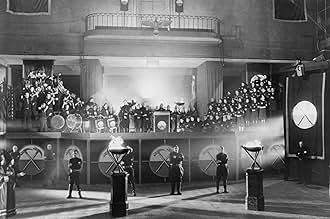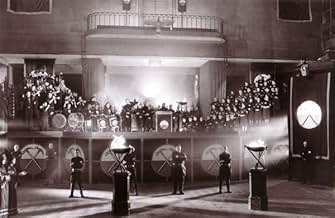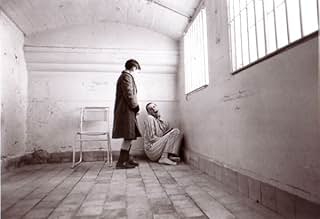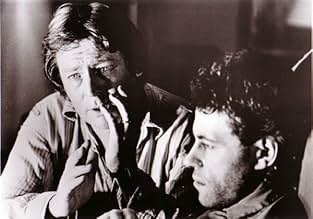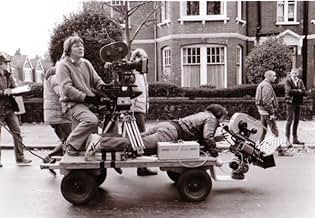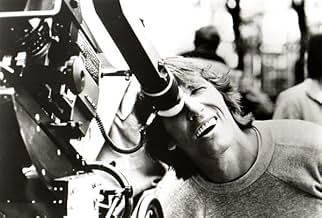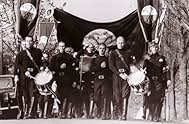NOTE IMDb
8,0/10
88 k
MA NOTE
Un rockeur renfermé sur lui-même et tourmenté plonge dans la folie alors qu'il s'isole de tous, physiquement et socialement.Un rockeur renfermé sur lui-même et tourmenté plonge dans la folie alors qu'il s'isole de tous, physiquement et socialement.Un rockeur renfermé sur lui-même et tourmenté plonge dans la folie alors qu'il s'isole de tous, physiquement et socialement.
- Réalisation
- Scénario
- Casting principal
- Victoire aux 2 BAFTA Awards
- 3 victoires et 2 nominations au total
Margery Mason
- Teacher's Wife
- (as Marjorie Mason)
Avis à la une
10zeemaza
If you like Pink Floyd, you'll love the movie regardless of what you think the cinematic value of the film is. To me, Roger Water's ability to express himself is outrageously smart. He is a genius. His English is masterful and the way he expresses how he feels is just mind-blowing. I am sure that every one of us has felt exactly the same as Pink/Roger felt at some point of our life but have never been able to successfully explain it. It is therefore my opinion that the lyrics are what make this film great. As a movie, it also translates those feelings well. All the actors were superb. Alan Parker managed to pull the whole thing together cleverly and all in all it is an excellent choice for a late night stoner's kick back - brilliant.
The opening tracking shot of a hotel hallway that resembles a prison should clue you in as to what awaits. There are so many things to like and be fascinated by in this movie. And for all of its avant-garde leanings, this is actually a very classically designed story. An iconoclastic music star, Pink Floyd, tries/tries not to think about his past and how he got to where he is, which is borderline psychotic. And because he's so disturbed, he can't even think in a linear way, so the journey we take into his mind is necessarily whacked-out.
We also get to see how fascism is born from misdirected hate and idolatry. As a rock star, Floyd has seen the adulation of his audiences, so he's familiar with the phenomenon. But at the same time, he detests them for buying into his act. It's like the old Groucho Marx joke about refusing membership to any group who would let you in. He knows he's a fake (his teachers and people like his wife have told him so), so everyone else who thinks he's real must be fakes also. It's a big cyclic game. So he can't let any of them in, behind his wall, because they are, by definition, phony.
It's interesting, also, to think about how he has turned full circle into fascism. It's just part of his dream and how he deals with his anger, but it's also an interesting reaction to the absent father. Had there been no homosexuals or Jews etc., there would have been no need for a Hitler, and therefore there would have been no need for his father to die. But instead of hating Nazis, he hates the people that "provoked" the Nazis. (I could go on for days with stuff like this, but I'll stop here.)
Just watch the movie and be impressed with the way it works on so many levels.
We also get to see how fascism is born from misdirected hate and idolatry. As a rock star, Floyd has seen the adulation of his audiences, so he's familiar with the phenomenon. But at the same time, he detests them for buying into his act. It's like the old Groucho Marx joke about refusing membership to any group who would let you in. He knows he's a fake (his teachers and people like his wife have told him so), so everyone else who thinks he's real must be fakes also. It's a big cyclic game. So he can't let any of them in, behind his wall, because they are, by definition, phony.
It's interesting, also, to think about how he has turned full circle into fascism. It's just part of his dream and how he deals with his anger, but it's also an interesting reaction to the absent father. Had there been no homosexuals or Jews etc., there would have been no need for a Hitler, and therefore there would have been no need for his father to die. But instead of hating Nazis, he hates the people that "provoked" the Nazis. (I could go on for days with stuff like this, but I'll stop here.)
Just watch the movie and be impressed with the way it works on so many levels.
10Zambelli
I have seen the movie several times now and every time I watch it I see something new, something I haven't seen or heard before. Some unsung line, some lost message... Every time I watch the movie I seem to dig deeper into this complex work of art.
However, I cannot tell you how disappointed I am that this movie is so underestimated, and, above all, misunderstood. How many times have you heard someone say something like: "You can't watch 'The Wall' unless you're really drunk or really high" ? I have heard this line probably from every single person that has seen the movie and it hurts me so much that nobody really tries to understand the movie.
The key to understanding the movie is in the lyrics. The movie is not just a long series of video clips that accompany the album. The images are just a final piece of the puzzle, the final touch on a magnificent piece of art.
The first time I saw this movie I felt very embarassed. Yes, embarassed, because I felt like a fool for hearing the album so many times and not realizing what it was about. The movie made me appreciate the lyrics of a rock song for the first time in my life.
The week after seeing "The Wall" for the first time I bought Pink Floyd's "The Final Cut". Do you know what was the first thing I did when I opened the CD case? I read the lyrics, from the first to the last word. And I actually tried to understand what the album was about.
"The Wall" is so much more than you think it is. The only solution to not understaning the movie is watching it again and paying more attention. Once you get it, you will never forget it.
However, I cannot tell you how disappointed I am that this movie is so underestimated, and, above all, misunderstood. How many times have you heard someone say something like: "You can't watch 'The Wall' unless you're really drunk or really high" ? I have heard this line probably from every single person that has seen the movie and it hurts me so much that nobody really tries to understand the movie.
The key to understanding the movie is in the lyrics. The movie is not just a long series of video clips that accompany the album. The images are just a final piece of the puzzle, the final touch on a magnificent piece of art.
The first time I saw this movie I felt very embarassed. Yes, embarassed, because I felt like a fool for hearing the album so many times and not realizing what it was about. The movie made me appreciate the lyrics of a rock song for the first time in my life.
The week after seeing "The Wall" for the first time I bought Pink Floyd's "The Final Cut". Do you know what was the first thing I did when I opened the CD case? I read the lyrics, from the first to the last word. And I actually tried to understand what the album was about.
"The Wall" is so much more than you think it is. The only solution to not understaning the movie is watching it again and paying more attention. Once you get it, you will never forget it.
"Pink Floyd The Wall" is a great film, based on the already great album by Pink Floyd! I was stunned by the use of imagery, combined with the great soundtrack of the album, which gave us a strange, drugged up vision of what a burnt out rock star would see. It's really crazy! Yet it shows how these famous rock stars are bombarded with fame and applause, and how insane it can drive an already disturbed person. "The Wall" itself, is the isolation and separation from society and saneness, which is a place that can easily be avoided if only people gave us a fair chance to. The depressing part about the film is that none of this is the rock star's fault. He was driven to it by loneliness in his growing up years(since he lost his father to the war), along with psychological torment by his teachers, parents, and above all, his sexually controlling wife. The movie is twisted because this is how the lead character sees the world. Worse yet, after he has already been driven to the edge of his own sanity, in his mind, the people who drove him to that edge, come back to testify against him. It's weird the first time you watch it, and looks a lot like a crazy music video that was pulled out of MTV. The only difference is that this one is telling a story, and has been transferred to the big wide screen. Alan Parker has directed the film, but Roger Waters seems to be in charge here, because it's his album, his story, and his conception. All that's really been done here is transforming the album to celluloid. I in some ways, like this better than the album, because now we have images to reinforce the songs and the story. I wish I could have seen this on the big screen, because the variety of images and the loud music seem compressed and compacted on a small TV set. You might not understand this the first time, especially if you haven't heard the album yet. But it really is a great film, and it actually has a story and a point that most music videos today unfortunately lack! I think that this film will teach people the reasons why these talented individuals suffer and lose their minds. The people that have guided and taken care of them while they grew up, often take away their ability to happily and normally function on their own. And the album and film's lesson is for not only the people who drove him to his wall to back off, but for him to pull himself out.
Roger Waters has weaved a compelling visual of the journey of a disturbed and misled mind. Though the viewer is sometimes left to sort out obscure animations and confusing images, it is not without direction. Subsequent viewings of this film reveal substance that only a genius could imbue in his writing. Character development through such subtle action in places casts a light upon Roger Waters as a person who understands the frailty of the human mind. The main character, Pink, portrays angles of the human condition we all face at some point by embodying a victimized character: sick over the loss of his father to the war; negatively spotlighted at school for talents that are apparently unfavorable at the time; unable or just unwilling to relate to his wife; and ultimately shut off from effectively relating to others because of an inability to express himself in ways that others understand.
Not only is the story captivating, but the music is such that it will always be noted as not only ahead of its time, but timeless.
The Wall is a masterpiece of storytelling, but not in the traditional sense. One must not watch this film expecting everything on a silver platter. Symbolism and metaphors abound, leaving a great deal of interpretation and adaptation to the viewer. Sit with an open mind and let Waters' character help you read into yourself.
Not only is the story captivating, but the music is such that it will always be noted as not only ahead of its time, but timeless.
The Wall is a masterpiece of storytelling, but not in the traditional sense. One must not watch this film expecting everything on a silver platter. Symbolism and metaphors abound, leaving a great deal of interpretation and adaptation to the viewer. Sit with an open mind and let Waters' character help you read into yourself.
Le saviez-vous
- AnecdotesIn his autobiography "Is That It?", Bob Geldof says that his agent first told him about the project while he was riding in a taxi, and that he said that he didn't want to do it because he didn't like the music of Pink Floyd. Roger Waters knows this story, not because he read it in Geldof's book, but because the taxi driver was actually Waters' brother.
- GaffesWhen Pink throws the television out the window before he cuts his hand, he mouths "Take that, fuckers!", but what is heard is "Next time, fuckers!" (This is corrected in the DVD release of "The Wall".)
- Versions alternativesThe final shot in the "Another Brick In The Wall, part 2" sequence, showing Young Pink and the Islington Green School class of 1951 throwing the Teacher into the bonfire, was deleted from the UK theatrical and Canadian VHS versions of the film, out of concern that actual children would try the stunt at home.
- ConnexionsEdited into Pink Floyd: Hey You (1982)
- Bandes originalesWhen the Tigers Broke Free
(separated into two sections)
Written by Roger Waters
Performed by Pink Floyd
Meilleurs choix
Connectez-vous pour évaluer et suivre la liste de favoris afin de recevoir des recommandations personnalisées
Détails
- Date de sortie
- Pays d’origine
- Langue
- Aussi connu sous le nom de
- Pink Floyd: Devor
- Lieux de tournage
- Saunton Sands, Devon, Angleterre, Royaume-Uni(bunker scenes)
- Sociétés de production
- Voir plus de crédits d'entreprise sur IMDbPro
Box-office
- Budget
- 12 000 000 £GB (estimé)
- Montant brut aux États-Unis et au Canada
- 22 244 207 $US
- Montant brut mondial
- 22 274 148 $US
- Durée1 heure 35 minutes
- Couleur
- Rapport de forme
- 2.39 : 1
Contribuer à cette page
Suggérer une modification ou ajouter du contenu manquant



